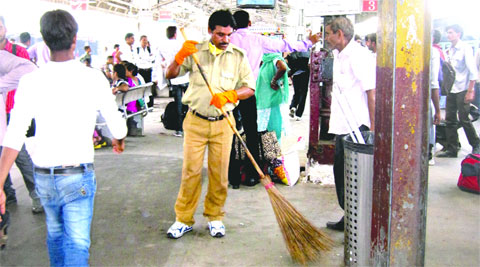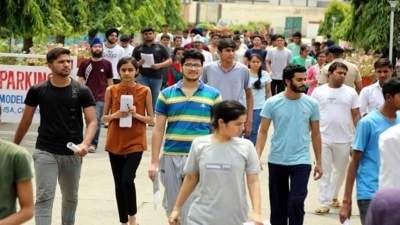- India
- International
Waste on wheels
A day in the life of: Virender Singh, 51, a safai karamchari at New Delhi Railway Station
 Virender Singh is on duty 6 am to 2 pm on most days, with a few tea breaks in between. He works six days a week
Virender Singh is on duty 6 am to 2 pm on most days, with a few tea breaks in between. He works six days a week
400 at work at India’s busiest rail station vs 2,000 kg of garbage generated daily. Why this safai karamchari or Rail Minister Sadananda Gowda have a job on their hands
An average 5 lakh footfalls a day, and just over 400 people handling the 2,000 kg of waste generated in their wake. In keeping India’s busiest train halt, New Delhi Railway Station, clean, that’s the battle being waged.
Virender Singh, 51, is one of the 149 safai karamcharis working for Northern Railways at the station. The domain of these safai karamcharis is platforms 2-15. Platforms 1, 16 as well as the tracks in between the platforms are outsourced to companies or NGOs working on a contractual or volunteer basis.
Singh has been cleaning platforms for over 28 years, including when there were 350 of them a few years ago. He can’t remember a time when they had an upper hand in the struggle to keep India’s premier station clean.
The station handles approximately 396 trains on its 16 platforms every day. To Singh, that’s packets of chips, polythene bags, plastic bottles, peanut shells and paan stains on walls those many times over. Besides, excreta and urine sprayed over the tracks have to be cleaned, and the stray dog shave to be chased away.

With a new focus on hygiene, Minister D V Sadananda Gowda announced a 40 per cent increase in funds for sanitation and cleanliness in the Railway Budget this year. The total allocation under this head is now about Rs 1,000 crore, the highest ever. Gowda also said CCTVs would be used to monitor the cleanliness drive.
There are two karamcharis deployed on a platform at any given time at the New Delhi station. Singh and another karamchari, Sant Lal, usually work together in the 6 am to 2 pm shift, six days of the week (Singh is off on Mondays). The other shifts are from 2 pm to 10 pm, and an overnight one from 10 pm to 6 am.
Singh lives with his family in a Type-I home at the railway staff quarters in Ashok Vihar, 10 km away. To be at work on time, he gets up at 5 am. Wife Madhu, 49, cooks him breakfast and packs him a lunch of his favourite daal-chawal to carry on most days.
Singh puts on one of the two khaki uniforms provided by the Railways before he leaves. “Ask anybody,” he says, talking about how he is never late, “Kaam kisi ki pehchan hoti hai (A man is known by his work). People are all different, some work diligently and others don’t. For me, loyalty and work come first.”
Having marked his attendance at the health inspector’s office on the first floor of the station, Singh heads for the cleaning shed on Platform 4 where all the tools he uses are kept. It’s his job to ensure that his half of the platform is clean for the next eight hours that follow, till 2 pm, with only a few breaks for tea in between.
That means going up and down the platform — this day, No. 2 — as and when people stream in and out of trains. He sweeps first to remove debris like hair, crumbs and plastic, and then pushes the mop forward in long straight lines before him. He repeats this around eight to nine times. He doesn’t get annoyed when people step on the floor he has just cleaned, he says. “Where else would they step?”
At times, he takes a break just to soak in the general chaos, he says, leaning on his mop and observing as people head for their destinations.
However, passengers hardly return the favour. Singh says they rarely listen when he asks them not to litter, just jeer and ask, “Tu kaun hai (Who are you)?”. “We can only request them to use bins and not litter, but who will really listen to us?” says Singh. “We have no power to fine them. All I can do is clean up their mess.”
The worst part, he says, is when a child eases herself on the platform. Singh has to borrow the hose used by the track cleaning crews to wash it off.
He also dreads it when trains get delayed. When people sit around for hours waiting, a pile of filth gradually accumulates around them, Singh notes. “I’ve realised over the years that people have no regard for their surroundings. Most can’t even get up to go to a dustbin 5 metres away.” There are between 250-300 bins at the station.
As per official figures, about 2,000 kg of waste is generated daily at the New Delhi Railway Station. Waste collectors from an NGO named Chintan, mostly ragpickers and drug addicts, collect the garbage from the bins and take it to a segregation facility at the station itself.
Chintan also set up a machine in 2010 that can crush up to 6,000 bottles a day — ensuring that these are not refilled and sold by hawkers.
A new composting unit was inaugurated at the station this year to recycle organic waste, like fruits and other food products. It was suggested that some be sent to railway colonies for use in gardens and parks, says Delhi Divisional Railway Manager A K Sachan.
The recyclable waste is sold to various dealers, who further sort it and process it. The wet waste is carried away by the MCD to the dumping ground.
Every four months, 640 brooms and 15-20 mops are purchased from Shakurbasti General Store Depot, Chandni Chowk, for the cleaning work, says a Railway Health and Malaria Inspector, Sunil Kumar Gupta. Besides, large quantities of phenyl, soap, hand soaps are ordered every four months or so. If the supplies get over, these are ordered from other sources and added to the inventory.
Talking about how hard it is to keep railway stations in India clean, Additional Divisional Railway Manager (Operations) Vivek Srivastava says, “Most Indians do not have a civic sense. They’ll keep their own houses clean, but not public spaces. You cannot expect railway stations to be islands of cleanliness.”
Once his shift is over, Singh makes his way home. It’s very difficult to contact him after this as son Ajit usually takes off with his phone for the rest of the day. Singh takes another quick bath, to wash away the dirt from work, and then unwinds watching news on TV. Dinner is at 8 pm and, by 9.30 pm, he’s fast asleep.
Singh shares the two-room-plus-kitchen living quarters with his mother and three other children. Son Amit (25) recently opened a shop selling cosmetics at Chandni Chowk. Ajit (24) and Sunil (21) are keen on getting into some kind of “private business”. The eldest, daughter Rajni, 27, helps her mother in household chores.
Talking about how there’s no scope for growth in the job — the reason his children did not want to join the Railways — Singh says, “The sad truth is that those who join as safai karamcharis retire as safai karamacharis.”
Since he joined in February 1986, Singh’s salary has gone up from Rs 600 a month to Rs 18,000. He doesn’t expect it to rise much by the time he retires in 2022.
Singh’s biggest concern these days though is arranging a groom for Rajni. The last offer that came got scuttled because she fell ill.
He hasn’t lost his faith though. When he takes a vacation, it is to go to either of the two religious places — Shirdi in Maharashtra or Vaishno Devi in Jammu and Kashmir.
Apr 18: Latest News
- 01
- 02
- 03
- 04
- 05






































